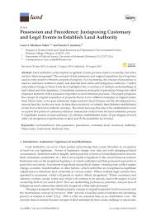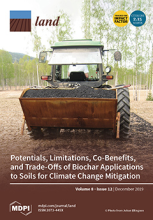/ library resources
Showing items 1 through 9 of 58.Land acquisition and use remain a critical issue of great policy relevance in developing countries such as Nigeria. This study therefore examined land acquisition and use in Nigeria within the context of food and livelihood security.
Land restitution carries implicit recognition of some previous claim to ownership, but when are first claims recognized? The concepts of first possession and original acquisition have long been used as entry points to Western concepts of property.
Building inclusive societies that reflect the needs of all categories of people within the social spectrum is critical to achieving sustainable development.
The guide focuses on equity and on how land tenure can be governed in ways that address the different needs and priorities of women and men.
Questions about how land is governed and controlled in the context of multiple crises are key to debates about fair transitions. The energy transition, net-zero ambitions, nature protection, and food system transformation all involve claims on land, water, and forests.
Secure land and property rights are essential for improving the livelihoods of the poor and ending poverty. Effective and equitable land governance can also contribute to economic development, domestic resource mobilisation and climate change resilience.
In 2017, the Food and Agriculture Organization of the United Nations (FAO) in Papua New Guinea (PNG) commissioned a gender assessment of the agriculture and rural sector in Papua New Guinea.
Paginação
Land Library Search
Through our robust search engine, you can search for any item of the over 73,000 highly curated resources in the Land Library.
If you would like to find an overview of what is possible, feel free to peruse the Search Guide.






